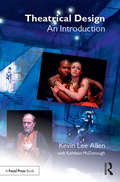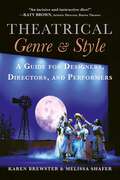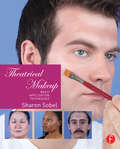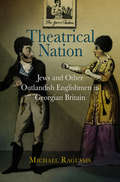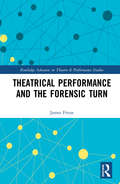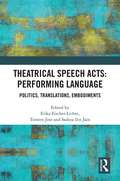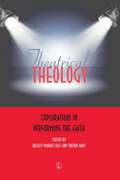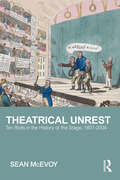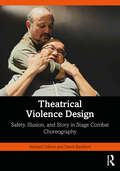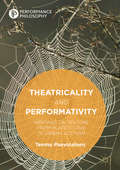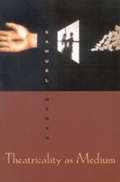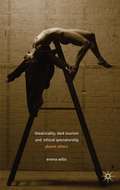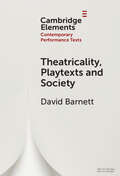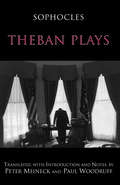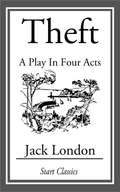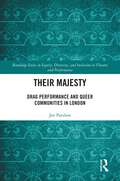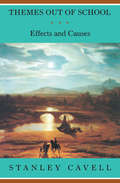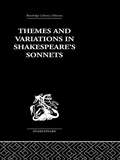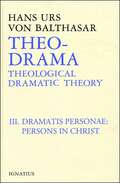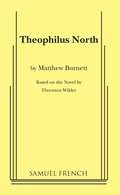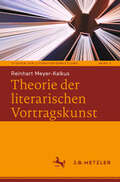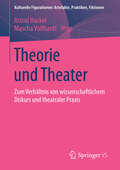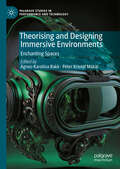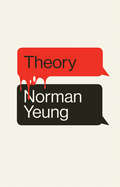- Table View
- List View
Theatrical Design: An Introduction
by Kevin Lee AllenA theatrical designer must address two questions when designing a production: What is the play about and what is the play like? To find the metaphor within a play is to unlock inspired and unique design concepts. Theatrical Design: An Introduction is about how to find the design idea for a production and what to do with that idea once identified. This book emphasizes script analysis and interpretation specifically for designers: how to release meaning and design inspiration from lines and characterization in a script. It then explains the artistic elements and principles of design—the skills necessary to create the design visualized. Concepts are illustrated with examples from theatre, film, art, architecture, and fashion that explore professional and historic use of conceptualization and metaphor. Theatrical Design: An Introduction imparts the tools designers need to innovate off the page.
Theatrical Genre & Style: A Guide for Designers, Directors, and Performers
by Melissa Shafer Karen BrewsterA one-of-a-kind guide about style and genre for theatre artisans.Theatrical Genre & Style will appeal to all theatre makers—those in performance as well as design—students, amateurs, and professionals. Traditionally, theatre practitioners receive information about style and genre from sources composed primarily for studio artisans and not theatre artisans. These books are helpful but ultimately fall short because they do not specifically apply the use of style to theatre art and practice. Theatrical Genre & Style gives theatre artists a guidebook to style and genre that is specific and tailored to their needs. Theatrical Genre & Style defines genre and style (and the differences between them), gives relatable examples with helpful exercises, clearly explains the distinctions between artistic style, period style, and literary style, and helps readers understand how to identify, research, and utilize appropriate artistic styles for theatrical productions. Theatrical genres are listed, thoroughly explained, and examples and exercises given that are designed to elucidate. The ways theatrical scenery, costumes, lighting, sound, multi-media, acting, directing, and movement can work together to successfully utilize style is addressed in this text.Theatrical Genre & Style serves as a companion to authors Karen Brewster and Melissa Shafer's Fundamentals of Theatrical Design: A Guide to the Basics of Scenic, Costume, and Lighting Design. The two books complement one another in content, size, scope, purpose, and target audience.
Theatrical Makeup: Basic Application Techniques
by Sharon SobelIn many theatrical productions, it falls to the performers to apply their own makeup, with minimal or no instruction. Theatrical Makeup clearly and concisely explains the basics of theatrical makeup techniques to allow stage actors to put their best face forward! You will gain understanding of the physiology of the human face and, using cream based makeup, as well as commercial cosmetics, learn how to contour it to suit your character with the use of highlight and shadow. Hundreds of full color images and step-by-step instructions illustrate how to visually manipulate bone structure and apparent age, apply simple facial hair and wounds, and create glamorous and natural stage makeup. Also covered are the tools you will need to apply your own makeup, along with critical health and hygiene tips.
Theatrical Makeup: Basic Application Techniques
by Sharon SobelTheatrical Makeup clearly and concisely explains the basics of theatrical makeup techniques to allow stage actors to put their best face forward! Readers will gain understanding of the physiology of the human face and, using cream based makeup, as well as commercial cosmetics, learn how to contour it to suit the character with the use of highlight and shadow. Hundreds of full color images and step-by-step instructions illustrate how to visually manipulate bone structure and apparent age, apply simple facial hair and wounds, and create glamorous and natural stage makeup. Also covered are the tools readers will need to apply their own makeup, along with critical health and hygiene tips. This book is suitable for beginner Theatrical Makeup courses and for stage actors of all levels.
Theatrical Nation
by Michael RagussisPerhaps the most significant development of the Georgian theater was its multiplication of ethnic, colonial, and provincial character types parading across the stage. In Theatrical Nation, Michael Ragussis opens up an archive of neglected plays and performances to examine how this flood of domestic and colonial others showcased England in general and London in particular as the center of an increasingly complex and culturally mixed nation and empire, and in this way illuminated the shifting identity of a newly configured Great Britain.In asking what kinds of ideological work these ethnic figures performed and what forms were invented to accomplish this work, Ragussis concentrates on the most popular of the "outlandish Englishmen," the stage Jew, Scot, and Irishman. Theatrical Nation understands these stage figures in the context of the government's controversial attempts to merge different ethnic and national groups through the 1707 Act of Union with Scotland, the Jewish Naturalization Bill of 1753, and the Act of Union with Ireland of 1800.Exploring the significant theatrical innovations that illuminate the central anxieties shared by playhouse and nation, Ragussis considers how ethnic identity was theatricalized, even as it moved from stage to print. By the early nineteenth century, Anglo-Irish and Scottish novelists attempted to deconstruct the theater's ethnic stereotypes while reimagining the theatricality of interactions between English and ethnic characters. An important shift took place as the novel's cross-ethnic love plot replaced the stage's caricatured male stereotypes with the beautiful ethnic heroine pursued by an English hero.
Theatrical Performance and the Forensic Turn: Naked Truth (Routledge Advances in Theatre & Performance Studies)
by James FriezeContemporary theatre, like so much of contemporary life, is obsessed with the ways of which information is detected, packaged and circulated. Running through forms as diverse as neo-naturalistic playwriting, intimately immersive theatre, verbatim drama, intermedial performance, and musical theatre, a common thread can be observed: theatre-makers have moved away from assertions of what is true and focussed on questions about how truth is framed. Commentators in various disciplines, including education, fine art, journalism, medicine, cultural studies, and law, have identified a ‘forensic turn’ in culture. The crucial role played by theatrical and performative techniques in fuelling this forensic turn has frequently been mentioned but never examined in detail. Political and poetic, Theatrical Performance and the Forensic Turn is the first account of the relationship between theatrical and forensic aesthetics. Exploring a rich variety of works that interrogate and resist the forensic turn, this is a must-read not only for scholars of theatre and performance but also of culture across the arts, sciences and social sciences.
Theatrical Speech Acts: Politics, Translations, Embodiments
by Erika Fischer-Lichte Torsten Jost Saskya Iris JainTheatrical Speech Acts: Performing Language explores the significance and impact of words in performance, probing how language functions in theatrical scenarios, what it can achieve under particular conditions, and what kinds of problems may arise as a result. Presenting case studies from around the globe—spanning Argentina, Egypt, Germany, India, Indonesia, Korea, Kenya, Nigeria, Rwanda, Thailand, the UK and the US—the authors explore key issues related to theatrical speech acts, such as (post)colonial language politics; histories, practices and theories of translation for/in performance; as well as practices and processes of embodiment. With scholars from different cultural and disciplinary backgrounds examining theatrical speech acts—their preconditions, their cultural and bodily dimensions as well as their manifold political effects—the book introduces readers to a crucial linguistic dimension of historical and contemporary processes of interweaving performance cultures. Ideal for drama, theater, performance, and translation scholars worldwide, Theatrical Speech Acts opens up a unique perspective on the transformative power of language in performance.
Theatrical Theology: Explorations in Performing the Faith
by Wesley Vander Lugt and Trevor HartTheology is inherently theatrical, rooted in God's performance on the world stage and oriented toward faith seeking performative understanding in the theatre of everyday life. Following Hans Urs von Balthasar's magisterial, five-volume Theo-Drama, a growing number of theologians and pastors have been engaging more widely with theatre and drama, producing what has been recognised as a "theatrical turn" in theology. Theatrical Theology includes essays from thirteen theologians and pastors who have contributed in distinct ways to this theatrical turn and who desire to deepen interdisciplinary dialogue between theology and theatre. The result is an unprecedented collection of essays that embodies and advances theatrical theology for the purpose of enriching theological reflection and edifying the church.
Theatrical Unrest: Ten Riots in the History of the Stage, 1601-2004
by Sean McEvoyShortlisted for the 2017 Theatre Book Prize What is it about theatre, compared to other kinds of cultural representation, which provokes such a powerful reaction? Theatrical Unrest tells the compelling tales of ten riots whose cause lies on stage. It looks at the intensity and evanescence of the live event and asks whether theatre shares its unrepeatable quality with history. Tracing episodes of unrest in theatrical history from an Elizabethan uprising over Shakespeare's Richard II to Sikhs in revolt at Gurpreet Kaur Bhatti's Behzti, Sean McEvoy chronicles a selection of extreme public responses to this inflammatory art form. Each chapter provides a useful overview of the structure and documentation of one particular event, juxtaposing eyewitness accounts with newspaper reports and other contemporary narratives. Theatrical Unrest is an absorbing account of the explosive impact of performance, and an essential read for anyone interested in theatre’s often violent history.
Theatrical Violence Design: Safety, Illusion, and Story in Stage Combat Choreography
by Richard Gilbert David BarefordTheatrical Violence Design offers the reader a complete education in the theory and practice of designing violence for the theater. From swordfights to exchanges of gunfire to domestic violence, the theater abounds in physical conflict. The artists who design that violence, sometimes called fight directors or choreographers, will find in this book an invaluable resource for becoming more expert at their craft. In the chapters of this book, they will encounter the core principles of creating violent effects, the body of knowledge with which they should be familiar, and the nuts and bolts of the process of design work from the first meeting with a director through closing night.This book is written for the student of stage combat to transition into violence design and will also be of interest to experienced violence designers and choreographers.
Theatricality and Performativity: Writings On Texture From Plato's Cave To Urban Activism (Performance Philosophy)
by Teemu PaavolainenThis book defines theatricality and performativity through metaphors of texture and weaving, drawn mainly from anthropologist Tim Ingold and philosopher Stephen C. Pepper. Tracing the two concepts’ various relations to practices of seeing and doing, but also to conflicting values of novelty and normativity, the study proceeds in a series of intertwining threads, from the theatrical to the performative: Antitheatrical (Plato, the Baroque, Michael Fried); Pro-theatrical (directors Wagner, Fuchs, Meyerhold, Brecht, and Brook); Dramatic (weaving memory in Shaffer’s Amadeus and Beckett’s Footfalls); Efficient (from modernist “machines for living in” to the “smart home”); Activist (knit graffiti, clown patrols, and the Anthropo(s)cene). An approach is developed in which ‘performativity’ names the way we tacitly weave worlds and identities, variously concealed or clarified by the step-aside tactics of ‘theatricality’.
Theatricality as Medium
by Samuel WeberEver since Aristotle's Poetics, both the theory and the practice of theater have been governed by the assumption that it is a form of representation dominated by what Aristotle calls the "mythos," or the "plot." This conception of theater has subordinated characteristics related to the theatrical medium, such as the process and place of staging, to the demands of a unified narrative. This readable, thought-provoking, and multidisciplinary study explores theatrical writings that question this aesthetical-generic conception and seek instead to work with the medium of theatricality itself. Beginning with Plato, Samuel Weber tracks the uneasy relationships among theater, ethics, and philosophy through Aristotle, the major Greek tragedians, Shakespeare, Kierkegaard, Kafka, Freud, Benjamin, Artaud, and many others who develop alternatives to dominant narrative-aesthetic assumptions about the theatrical medium. His readings also interrogate the relation of theatricality to the introduction of electronic media. The result is to show that, far from breaking with the characteristics of live staged performance, the new media intensify ambivalences about place and identity already at work in theater since the Greeks. Praise for Samuel Weber: “What kind of questioning is primarily after something other than an answer that can be measured . . . in cognitive terms? Those interested in the links between modern philosophy nd media culture will be impressed by the unusual intellectual clarity and depth with which Weber formulates the . . . questions that constiture the true challenge to cultural studies today. . . . one of our most important cultural critics and thinkers”—MLN
Theatricality, Dark Tourism and Ethical Spectatorship
by Emma WillisTheatricality, Dark Tourism and Ethical Spectatorship: Absent Others builds upon recent literature concerning theatre and ethics and offers a uniquely interdisciplinary approach. With a focus on spectatorship, the book brings together analysis of dark tourism – travel to sites of death and disaster – and theatrical performances. At dark tourism sites, objects and architecture are often personified, imagined to speak on behalf of absent victims. Spectatorsare drawn into this dialogical scenario in that they are asked to 'hear' the voices of the dead. Theatrical performances that depict grievous histories often gain power through paradoxically demonstrating the limits of their representational ability: spectators are asked to attune themselves to absences and incomprehensibilities. This study asks whether playing the part of the listener can be understood in ethical terms. Sites surveyed span a broad geographical scope – Germany, Poland, Vietnam, Cambodia, New Zealand and Rwanda – and are brought into contrast with performances including: Jerzy Grotowski's Akropolis, Catherine Filloux's Photographs from S21, Adrienne Kennedy's An Evening with Dead Essex and Erik Ehn's Maria Kizito.
Theatricality, Playtexts and Society (Elements in Contemporary Performance Texts)
by David BarnettThis Element proposes a novel way of defining, understanding and approaching theatricality, a term that exists both in the theatre and, more broadly, in everyday life. It argues that four foundational, material processes of theatre-making manifest themselves in all playtexts in both overt and covert forms. Each of the four sections defines a different theatrical process, explores its functions in two chosen playtexts and examines its implications for the wider experience of the spectators outside the theatre. The Element concludes with a supplementary reflection on performance to show how even seemingly untheatrical playtexts can be analysed and staged to reveal their unspoken theatricality. It also argues that this new understanding of theatricality has a politics, that the artifice of any theatre and the constructedness of any society are analogous and that both, consequently, can be fundamentally changed. This Element is also available as Open Access on Cambridge Core.
Theban Plays
by Sophocles Paul Woodruff Peter MeineckThis volume offers the fruits of Peter Meineck and Paul Woodruff's dynamic collaboration on the plays of Sophocles' Theban cycle, presenting the translators' Oedipus Tyrannus (2000) along with Woodruff's Antigone (2001) and a muscular new Oedipus at Colonus by Meineck. Grippingly readable, all three translations combine fidelity to the Greek with concision, clarity, and powerful, hard-edged speech. Each play features foot-of-the-page notes, stage directions, and line numbers to the Greek. Woodruff's Introduction discusses the playwright, Athenian theatre and performance, the composition of the plays, and the plots and characters of each; it also offers thoughtful reflections on major critical interpretations of these plays.
Theft: A Play in Four Acts
by Jack LondonJack London (January 12, 1876 - November 22, 1916), was an American author who wrote The Call of the Wild and other books. A pioneer in the then-burgeoning world of commercial magazine fiction, he was one of the first Americans to make a huge financial success from writing.The Scarlet Plague was written by Jack London and originally published in London Magazine in 1912. It was re-released in February of 2007 by Echo Library. The story takes place in 2072, sixty years after the scarlet plague has depopulated the planet. James Howard Smith is one of the few people left alive in the San Francisco area, and as he realizes his time grows short, he tries to impart the value of knowledge and wisdom to his grandsons.American society at the time of the plague has become severely stratified and there is a large hereditary underclass of servants and "nurses"; and the politcal system has been replaced by a formalized oligarchy. Commercial airship lines exist, as do some airships privately owned by the very rich.
Their Majesty: Drag Performance and Queer Communities in London (Routledge Series in Equity, Diversity, and Inclusion in Theatre and Performance)
by Joe ParslowThis book explores drag performance in London since 2009 via the pubs, bars and clubs that make LGBTQ+ communities thrive.It studies the complex relationship between drag performance, LGBTQ+ venues and queer communities. In exploring drag performance, the book develops a greater understanding of the connection between drag performance and queer communities, in particular exploring how drag might facilitate queer communities and offer queer modes of survival and resistance for queer people. Through this, the book describes a contemporary moment in which drag performance is increasingly popular and increasingly important at a time when homophobic and transphobic violence is prevalent, and LGBTQ+ venues are often under threat of closure. Understanding the increased/increasing mainstream popularity of drag, the book examines drag performance that is connected to and resists mainstream attention in order to account for its complexity in London (and beyond).This book takes the author’s engagement with and love for drag and exerts a critical, political and queer pull in order to develop new terrains of queer studies and queer performance studies.
Themes Out Of School: Effects and Causes
by Stanley CavellIn the first essay of this book, Stanley Cavell characterizes philosophy as a "willingness to think not about something other than what ordinary human beings think about, but rather to learn to think undistractedly about things that ordinary human beings cannot help thinking about, or anyway cannot help having occur to them, sometimes in fantasy, sometimes as a flash across a landscape. " Fantasies of film and television and literature, flashes across the landscape of literary theory, philosophical discourse, and French historiography give Cavell his starting points in these twelve essays. Here is philosophy in and out of "school," understood as a discipline in itself or thought through the works of Shakespeare, Molière, Kierkegaard, Thoreau, Brecht, Makavejev, Bergman, Hitchcock, Astaire, and Keaton.
Themes and Variations in Shakespeare's Sonnets
by J B LeishmanFirst published in 1961. This study analyses Shakespeare's treatment of the universal themes of Beauty, Love and Time. He compares Shakespeare with other great poets and sonnet writers - Pindar, Horace and Ovid, with Petrarch, Tasso and Ronsart, with Shakespeare's own English predecessors and contemporaries, notably Spenser, Daniel and Drayton and with John Donne. By discussing their resemblances and differences, a not altogether orthodox picture of Shakespeare's attitude to life is presented, which suggests that he was not as phlegmatic and equable a person as critics have often supposed.
Theo-Drama: Dramatis Personae—Persons in Christ (Theological Dramatic Theory #3)
by Graham Harrison Hans Urs Von BalthasarThe third volume of Theo-Drama is considered the most central book of Fr. von Balthasar's entire theological project. Structrually it is the middle volume of the middle part of his theological trilogy: Glory of the Lord, Theo-Drama, and Theo-Logic. More significantly, it contains von Balthasar's synthetic treatment of the central mysteries of the Catholic Faith: Christ, Mary, the Church, man and the Trinity. <p><p>The various elements of von Balthasar's theological reflection converge here, and here as nowhere else one can find the systematic elaboration of his Christology, Mariology, ecclesiology, anthropology and trinitarian doctrine. It is both a one-volume compendium of this theology and a key to his trilogy and other writings.
Theophilus North
by Matthew BurnettMatthew BurnetBased on the Thornton Wilder novel. Comedy/Drama. Characters: 4 male, 3 female to play over 20 characters . Simple sets. Helen Hayes Award nomination, Outstanding New Play. It is the spring of 1926. Thirty year old Theophilus North quits his teaching post in New Jersey and embarks on a quest for fun, adventure and his place in the world. His used car breaks down in Newport, Rhode Island, and he is stranded in this city of renowned wealth. Theophilus becomes involved in the lives and troubles of Newport's residents and is changed by the lessons he learns through them. Effective with minimal sets, properties and costumes, this touching, funny and insightful charmer is exceptionally easy to produce. "Hope pulses so strongly through Theophilus North.... Burnett injects his script with cosmic scope.... Imaginative, forceful theater.... Charming and breathtaking all at once.... In the spirit of Wilder and with a dramatic vigor all its own, the play turns large-hearted living into art." --Variety . "Undaunted, [it] evokes...tender, unforced humanity.... Rich in dry humor, and in Wilder's...philosophy that the cosmic permeates the quotidian.... Gently funny, spryly wise..." --Time Out New York . "Charming... Captures Wilder's spirit of genial humor and tempered optimism.... Ignites sparks of surprisingly deep emotion." --New York Daily News . "Excavates the Wilder play buried in the novel.... This Theophilus North is unmistakably a cousin of Our Town.... There are muscles rippling under the play's rose-scented skin." --New York Sun . "Five stars.... Purely sparkles with intelligence, wit and humanity.... This is a play both for the head and the heart." --TalkinBroadway.com . "Beautiful and intelligent... A mixture of Wilderesque sobriety and esprit. The late author would undoubtedly have tipped his boater..." --TheaterMania.com
Theorie der literarischen Vortragskunst (Studien zur Literaturvermittlung #5)
by Reinhart Meyer-KalkusTheoretische Ansätze zur Analyse literarischer Vortragskunst thematisieren gewöhnlich nur Teilaspekte, aber nicht das Zusammenspiel aller ihrer Faktoren, also von Akteuren, Zuhörern, Räumen, Performances, Vortragsvorlagen und Medientechniken. Auf der Grundlage von Goffmans Performance-Begriff und der amerikanischen Ethnographie des Sprechens entwickelt das vorliegende Buch eine umfassende Konzeption der Vortragskunst als Interaktionsritual und greift dabei auf sprech- und literaturwissenschaftliche Formanalysen zurück, um die Vortragsstimme, ihre unterschiedlichen Sprechgattungen und prosodischen Ausdrucksmittel zu beschreiben.
Theorie und Theater
by Astrid Hackel Mascha VollhardtDie Theaterwissenschaft beruft sich gern auf den gemeinsamen Ursprung von Theorie und Theater. Ein Grund zu fragen, auf welche Weise akademische Diskurse Eingang in zeitgenössische Performances, Tanz- und Theaterinszenierungen finden und was diese umgekehrt zur Vermittlung oder sinnlichen Fremdwerdung theoretischen Wissens beitragen können. Untersucht werden die zahlreichen Verflechtungen und Unwägbarkeiten zwischen Theorie und Theater, die szenische Selbstreferenzialität und Widerständigkeit gegen die eigene Theoretisierbarkeit, die Herausforderungen im Umgang mit humanwissenschaftlichen, (post-)feministischen und queeren Theorien sowie der Stellenwert von Sprache, Sinn und Sinnlichkeit in zeitgenössischen Inszenierungen.
Theorising and Designing Immersive Environments: Enchanting Spaces (Palgrave Studies in Performance and Technology)
by Ágnes-Karolina Bakk Péter Kristóf MakaiThis edited volume discusses the topic of immersion, approaching it from the perspective of various media and stakeholders: experiencers and creators. While the concept of immersion has gained widespread currency in the last decades beyond video games, its critical theory has not reached the same momentum, meaning that there is no unified way of using the term. This causes many misunderstandings and stands as an obstacle to successful expectation management processes, especially in the entertainment industry. This book presents a nuanced platform of discussion to answer the question of how immersion can manifest itself in different media, and how creators are embracing the current trends within the experience economy.
Theory
by Norman YeungIs there a limit to free speech? Who gets to decide? Isabelle’s film theory students are stunned that she would open an unmoderated online discussion group to complement a controversial syllabus. Her intention was for them to learn from each other, but when an anonymous student starts to post racist comments and offensive videos on the forum and others challenge Isabelle’s methods, she is forced to decide whether to intervene or to let the social experiment play out. But the posts soon turn abusive and threatening to Isabelle’s relationship with her wife, Lee, causing her to take matters into her own hands. In this thrilling exploration of the intersections and divisions within liberalism, a young tenure-track professor finds herself in a high-stakes game of cat-and-mouse that has her questioning her beliefs and fighting back for her life.
